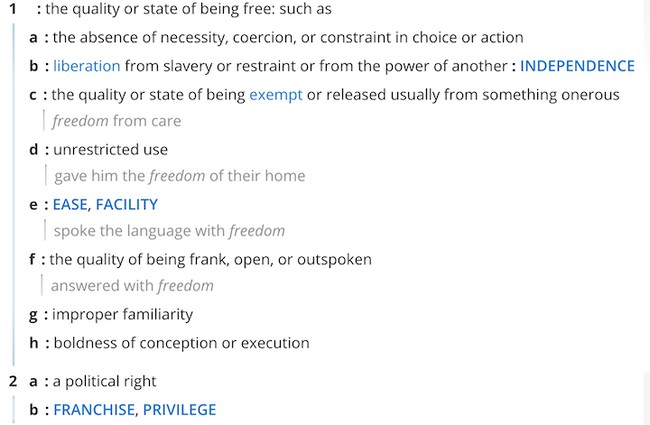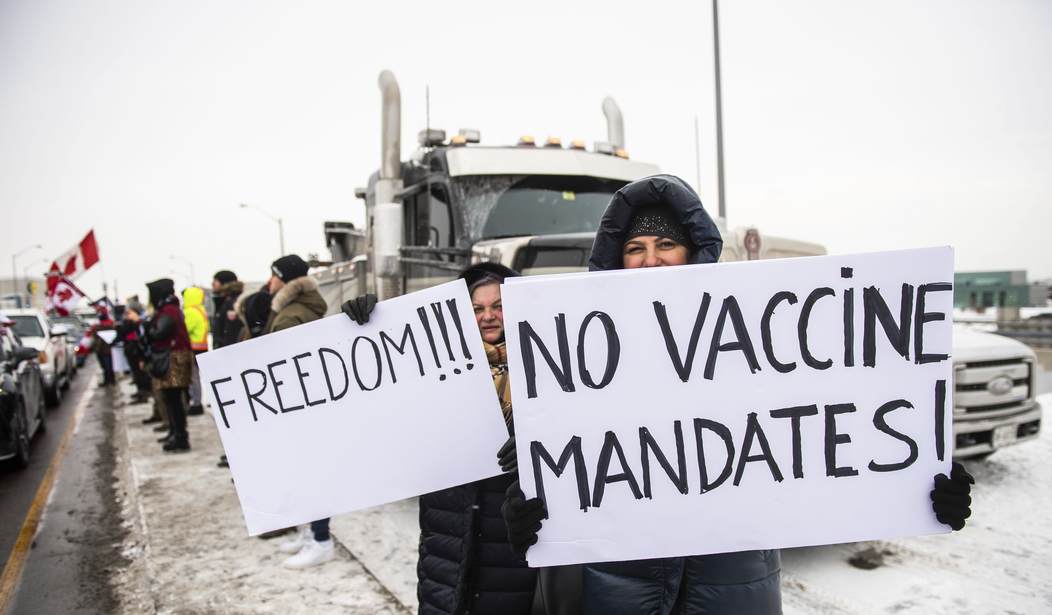I like to think of myself as a thoughtful, artful writer. I weigh my words carefully. I like a certain dramatic flare, a certain flourish, if you will. I’m an artist, when all is said and done.
I find myself at a loss for words after reading an article from the Canadian Broadcast Corporation (CBC) on how the word “freedom” has become a “far-right” buzzword. After pondering and deliberating and contemplating and a lot of other synonyms for “thinking” I found in the thesaurus, I eventually decided the best approach to this topic is an honest one.
This is the craziest, crazy-pants article from Crazytown I’ve ever read. What the hell, Canada?
The premise? The word “freedom” has become a dangerous “rallying cry” for right wingers in the Great White North, and, presumably, beyond.
The article is written on behalf of the CBC program (or, as the Canadians say, programme) called Cross Country Checkup, and the writers are Very Concerned™ about all this freedom talk lately, particularly as it relates to the Canadian Freedom Convoy that so famously protested the COVID lockdowns there.
Often associated with protests and rallies in the United States, the term has taken hold among protesters who are part of the Freedom Convoy, which rolled into Ottawa in late January and has become entrenched in the city’s downtown.
For many, freedom is a malleable term — one that’s open to interpretation.
Well…no…the word “freedom” isn’t really open to interpretation. It’s a pretty static word, much like the word “word.” Here’s the definition from Merriam-Webster dictionary.

Even the subsections of the word are pretty much just slightly different concepts of the same word. It’s a basic concept. Why is the CBC trying to pretend it isn’t?
But wait! There’s more!
“It is a term that has resonated…. You can define it and understand it and sort of manipulate it in a way that makes sense to you and is useful to you, depending on your perspective,” she told Cross Country Checkup.
It’s also a term that has thrived among far-right groups, said Perry, one of a number of experts who say the presence of far-right groups in Canada is growing.
As seen among some protesters currently opposing vaccine mandates and other public health measures, freedom signals a desire for freedom from government intervention or overreach, Perry noted.
“Freedom signals a desire for freedom from government intervention or overreach.” I fail to see the problem here. Perhaps that is a sign that even though I was born a Canadian, I haven’t considered myself one since I left at 18-years-old.
This whole article makes me itchy, and also brings up a few questions.
If “the term” doesn’t mean freedom from government overreach, what exactly is it supposed to mean in the context of one’s human rights? When is it okay to use the dictionary definition of freedom?
The CBC provides lots of examples of what freedom is not, but still fails to tell us what it is.
“Freedom is a slippery concept,” said [Elisabeth] Anker, an associate professor of political science at George Washington University and author of Ugly Freedoms, which examines the history of how freedom, as a concept, has been used in American society.
“On the far right, [individual freedom] is often translated into somebody who refuses to be bound by norms of equality, treating all people equally or norms to remedy inequality, whether that’s trying to remedy racial discrimination or gender discrimination.”
That sounds like a “you” problem, Professor Anker, not a “them” problem. She could have stopped her analysis at “refuses to be bound.” In a healthy society where everyone respects the freedom of others (particularly when it comes to government) logic would dictate that just as these people have the freedom to oppose masks or vaccines or whatever is making the nanny-state progressives so cranky, so does everyone else have the freedom to ignore those people. You have the freedom to stay home, or mask up, or move to a place that loves masks, like China. You have the freedom to stand on the street and yell at them as they pass by with whole faces just…there, for everyone to see. You are free to be opposed.
Freedom is a two-way street, unless you’re an elitist, socialist, pseudo-intellectual. Then it’s actually a pair of handcuffs, and only certain people get to keep the keys.
What exactly is the appropriate use of the word? If (to repeat the previous quote) “Freedom signals a desire for freedom from government intervention or overreach,” and the “experts” in this article posit that as a bad thing, we must assume there is a better thing, a better definition that is the opposite of that very bad notion of being free to make one’s own decisions. If we draw that statement all the way out to its logical conclusion, the “experts” are saying that the appropriate meaning of freedom is to be accepting of government intervention and welcoming of government intervention.
I just looked at the Merriam Webster definition again and it says exactly the opposite. So, who are the people actually manipulating the word for their own ends?
It’s the CBC, in case you didn’t get it. It’s them. They’re the weirdos.
I understand why the word “freedom” is a rallying cry for all seeking release from government oppression – from American slaves to the suffragette movement to Canada’s Freedom Convoy. The people who have advocated for freedom under its very definition owe no explanation as to why.
The question isn’t why anyone fighting oppression in any form would covet freedom…the question is why the CBC does not.













Join the conversation as a VIP Member